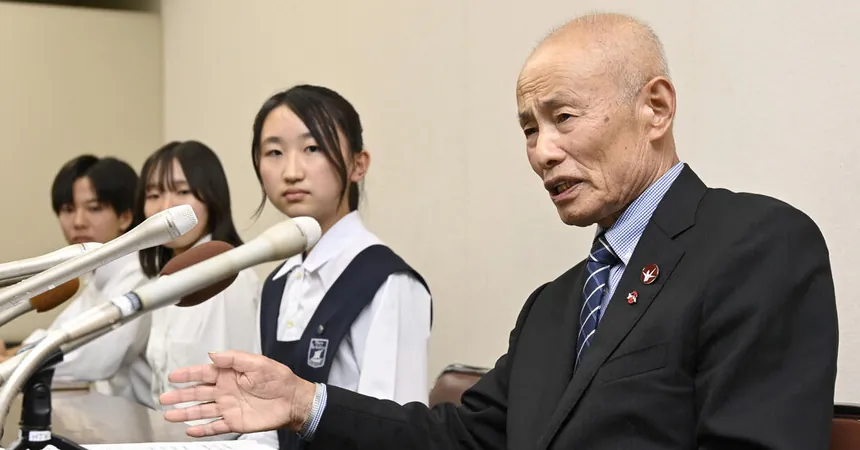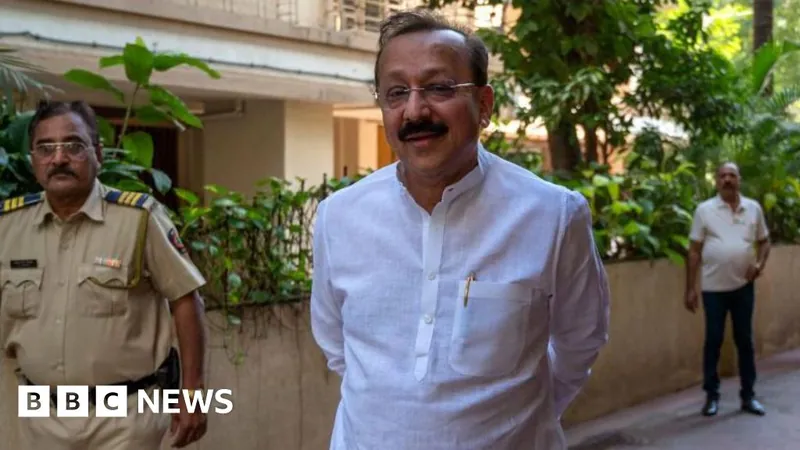
Nobel Peace Prize Awarded to Japanese Atomic Bomb Survivors Group Amid Rising Nuclear Tensions
2024-10-12
Author: Wei
Nobel Peace Prize Awarded to Japanese Atomic Bomb Survivors Group Amid Rising Nuclear Tensions
In a remarkable recognition of resilience and peace advocacy, the 2024 Nobel Peace Prize has been awarded to Nihon Hidankyo, a grassroots organization composed of Japanese atomic bomb survivors, known as hibakusha. This prestigious honor acknowledges their tireless efforts to eliminate nuclear weapons globally just as the world grapples with escalating geopolitical tensions and nuclear threats, notably from Russia amid the ongoing war in Ukraine and the lurking concerns surrounding Iran and North Korea's nuclear ambitions.
Jorgen Watne Frydnes, chairman of the Norwegian Nobel Committee, emphasized the significance of the hibakusha’s testimony, stating, “They help us to describe the indescribable and to contemplate the unthinkable devastation caused by nuclear weapons.” He highlighted that the first nuclear attacks on Hiroshima and Nagasaki led to a "nuclear taboo," denoting an unwritten rule against the use of atomic weapons in warfare, a taboo that has alarmingly begun to weaken in recent years.
The decision to honor Nihon Hidankyo, particularly poignant with many survivors now in their 80s, symbolizes a tribute not only to their suffering but also their inspiring choice to channel that pain into advocacy for a future free of nuclear threats. Frydnes expressed hope that their legacy would encourage emerging generations in Japan and globally to continue the struggle for nuclear disarmament.
Nihon Hidankyo was formed in 1956, shortly after the devastation wrought by the atomic bombings of August 1945, which resulted in the deaths of approximately 200,000 individuals by direct impact and subsequent radiation sickness. Following the bombings, hibakusha faced widespread stigmatization, often regarded as reminders of the horrors of war. Despite this, their persistence has been crucial in raising awareness about the impacts of nuclear weapons and advocating for peace.
Today, over 100,000 hibakusha continue to live with the physical and psychological scars of their experiences. They have become powerful witnesses, sharing harrowing stories of loss and survival, advocating against the threat of nuclear weapons while battling against a society that often wishes to forget their trauma. The Nobel Committee recognized that their statements and testimonies have significantly contributed to establishing the nuclear taboo—essential for ensuring that such devastation is never repeated.
The award comes at a critical juncture as nuclear powers pursue modernization of their arsenals and expanding nations express aspirations for nuclear capabilities. As the world observes Russia’s precarious strategies and fears over nuclear proliferation in Asia and the Middle East, Frydnes cautioned that we must not overlook the peril these weapons pose, calling them “the most destructive weapons the world has ever seen.”
Japan’s Prime Minister Shigeru Ishiba acknowledged the award's importance in the context of Japan's evolving defense policy amidst its proximity to nuclear powers like Russia and China. While public sentiment largely supports disarmament, a segment of younger Japanese is beginning to express shifts toward a more deterrent-focused security approach. This complex interplay of perspectives underscores a nation grappling with its past while navigating a volatile security landscape.
As calls for nuclear abolition grow increasingly urgent, Nihon Hidankyo's tireless commitment resonates ever more powerfully, urging that we must abolish nuclear weapons “while we are alive.” As the hibakusha continue to share their stories, they remind us of the profound human cost of nuclear warfare and the imperative for a peaceful future.
In the face of existential threats, the Nobel Committee's recognition serves not only as a tribute to the past but also as a clarion call for ongoing efforts towards peace and disarmament. Nishon Hidankyo’s work illuminates the path forward, highlighting that the fight against nuclear armament is far from over.



 Brasil (PT)
Brasil (PT)
 Canada (EN)
Canada (EN)
 Chile (ES)
Chile (ES)
 España (ES)
España (ES)
 France (FR)
France (FR)
 Hong Kong (EN)
Hong Kong (EN)
 Italia (IT)
Italia (IT)
 日本 (JA)
日本 (JA)
 Magyarország (HU)
Magyarország (HU)
 Norge (NO)
Norge (NO)
 Polska (PL)
Polska (PL)
 Schweiz (DE)
Schweiz (DE)
 Singapore (EN)
Singapore (EN)
 Sverige (SV)
Sverige (SV)
 Suomi (FI)
Suomi (FI)
 Türkiye (TR)
Türkiye (TR)